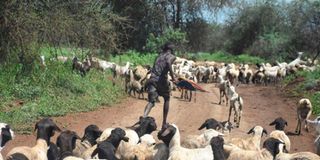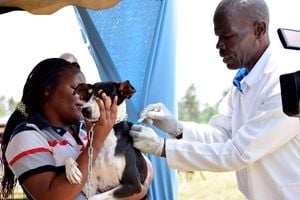Turkana adopts new strategy to fight zoonotic diseases

A herder grazes goats and sheep along Isiolo-Kinna-Garbatulla road. Outbreaks of Rift Valley Fever, a viral zoonosis most commonly seen in domesticated animals such as cattle, sheep and goats, are recurrent in Kenya.
What you need to know:
- Between March and December last year, there was a measles outbreak in Turkana County where 20 deaths and 694 cases were reported.
- The county also experienced the re-emergence of tsetse fly infestation and detection of a deadly mosquito species.
In the backdrop of a measles outbreak in Turkana County where 20 deaths and 694 cases were reported between March and December last year, re-emergence of tsetse fly infestation and detection of a deadly mosquito species, scientists and environmentalists have adopted a One Health strategy to tackle climate-related diseases.
The five-year strategy focuses on integrating efforts to combat zoonotic diseases that are transmitted between people and animals, enhance food safety and promote environmental sustainability by creating a more resilient and responsive healthcare system.
County Director for Preventive and Promotive Bonventure Ameyo said the One Health approach will address health threats in the animal-human-environment interface in remote areas so that human life is protected, livestock are healthy and the environment is safe.
“Apart from having unreliable health systems, remote areas bordering Uganda and South Sudan are experiencing environmental degradation that contributes to emergency and re-emergency of diseases. Scientists and environmentalists will now work together to tackle such health threats,” Dr Ameyo said.
County Speaker Christopher Nakuleu said they are developing a policy framework to guide the implementation of the strategy that has a potential of strengthening the health system by fostering collaboration among various stakeholders.
Livestock Development Executive Anthony Apalia noted that the strategy aligns with the county’s commitment to building a healthier and more sustainable future for locals. “By working together across sectors, we can address health challenges more effectively,” he said
His Environment counterpart Elizabeth Loote termed the strategy important as it would enhance the resilience of ecosystem for the well-being of human and livestock. Core Group Partners’ Project Secretariat Deputy Director Josephine Ihahi emphasised the need for community engagement and public education to raise awareness about the inter-connected nature of health.
“We should engage the community through the county’s One Health unit to understand the contents of the strategy,” she said. She noted that in partnership with the county’s department of Health and the International Rescue, they have through the One Health approach stepped up zoonotic diseases surveillance in Turkana West, Loima and Kibish Sub-counties that will inform early disease detection and response so that health services for both human and animal populations are enhanced.
The collective efforts of the county and its partners seeks to ensure successful access and vaccination of high-risk and remote populations.





